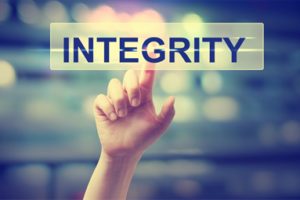 Can you teach it? Is it genetic? We know you cannot buy it. We all highly value it and yet it seems to be in such short supply.
Can you teach it? Is it genetic? We know you cannot buy it. We all highly value it and yet it seems to be in such short supply.
Integrity.
We may call it ethics, honesty, virtues or moral principles, but in the end, we inherently all have a sense of what it is. It is not a new concept. The earliest writings of Jewish and Greek philosophers have discussed the role of ethics in society.
In recent years, business and political leaders have incorporated ethical standards into their policies, Standing Committees, Officers of the Crown and legislation. But can we actually legislate or teach what integrity is?
It seems that on a regular basis, we witness ways that business leaders and politicians have mishandled financial resources, dealt with staff or customers or maintained a double standard – “rules for you and different rules for me”.
So how did we arrive here – or has integrity always been in flux? Gone are the days of a business deal committed to on the shake of your hand.
Breaches of integrity have been around under various names and titles – the flimflam man, snake oil salesman, confidence man – and the results were similar – run out of town on a rail, tar and feathered or more recently fined or imprisoned.
Warren Buffet is quoted that, “It takes 20 years to build a reputation and five minutes to ruin it. If you think about that, you’ll do things differently”. Sadly, it seems that an increasing number of people are more focused on the five minutes than they are with the long-term.
The adage that fish rot from the head down, certainly applies to the political and business worlds. When the leader makes questionable decisions for personal gain, isn’t that the example that he or she is setting for everyone to follow? When citizens are asked to isolate due to COVID-19 but some political leaders choose to travel, what message do citizens hear?
Sadly, there is an acceptance by many in society that the lack of integrity is the new norm. That one scandal covers up another. Could it be that we have become immune to ethical breaches?
So, what to do?
Simply, I believe that it is up to each of us to set the example for others and call out those that breach those standards of integrity. If we set a high standard for ourselves to follow, we are a beacon to those around us. If we refuse to accept the low or non-existent standards of others, we lead the charge and others will rally to the higher standard as well.
Yes, there will be those that say what they are doing is not illegal, but are their actions on the moral high ground? That will be the judgment of others around them, and especially those that are impacted by the outcome.
Integrity is not something that we experience indifferently, it is the gold standard of all that we do. If we want to have trust across our political and business worlds, we collectively need to up our game.
Perhaps integrity is summarized best by The Golden Rule, “do to others what you would have them do to you” (Matthew 7:12)
Dave Quist
Principal













